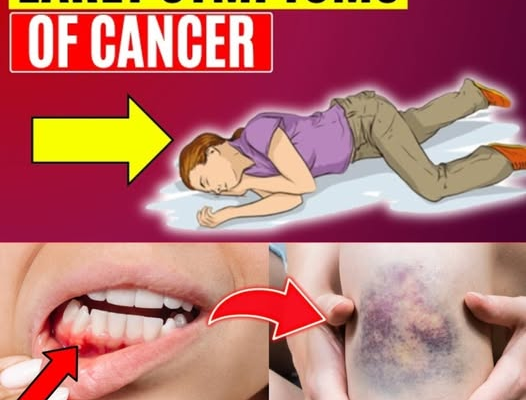Your Body Might Be Trying to Tell You Something—Listen Closely
When it comes to cancer, early detection can save lives. But the tricky part? Cancer symptoms often start off so subtle, they’re easy to miss—or brush off as something minor. Your body is constantly sending signals, and knowing what to watch for could make all the difference.
Here are 12 early signs of cancer you should never ignore. While these symptoms don’t always mean cancer, they do deserve your attention—especially if they persist or worsen over time.
.jpg)
1. Unexplained Weight Loss
If you’ve lost more than 10 pounds without changing your diet or exercise habits, don’t ignore it. Sudden weight loss can be an early sign of cancers like pancreatic, stomach, esophageal, or lung cancer.
👉 Why it matters: Cancer cells often use up a lot of the body’s energy and can disrupt metabolism.
2. Fatigue That Doesn’t Go Away
We all get tired, but if you’re constantly exhausted—even after a full night’s sleep—it could be more than just stress or a busy schedule.
👉 Watch for: Fatigue that interferes with your daily life or comes on suddenly and lasts for weeks.
3. Persistent Pain
Pain is your body’s way of saying something’s wrong. Ongoing pain in one area—especially if it’s new or unusual—may signal cancer.
- Back pain → possible sign of ovarian or colon cancer
- Headaches → could indicate a brain tumor
- Bone pain → may point to leukemia
4. Changes in Skin
Your skin can reflect your internal health. Keep an eye on:
- New moles or changes in existing ones
- Sores that won’t heal
- Yellowing of the skin or eyes (jaundice)
- Darker-looking skin patches or redness
👉 Bottom line: If your skin starts acting out in strange ways, don’t brush it off.
5. Lumps or Swelling
Feeling a new lump or bump under your skin? It’s time to get it checked. This is especially important in areas like:
- Breasts
- Testicles
- Neck
- Groin
- Abdomen
Most lumps are harmless—but some are not.
6. Unusual Bleeding
Blood showing up where it shouldn’t is always a red flag. Watch out for:
- Blood in stool or urine
- Vaginal bleeding between periods or after menopause
- Coughing up blood
- Unexplained bruising
These symptoms could signal cancers like colon, bladder, cervical, or lung cancer.
7. Changes in Bowel or Bladder Habits
Pay attention to your bathroom routine. Persistent constipation, diarrhea, or changes in urine frequency or color can point to gastrointestinal or urinary cancers.
👉 Tip: If your habits shift for more than a few days, it’s time to see a doctor.
8. Trouble Swallowing
Difficulty swallowing food or feeling like something’s stuck in your throat can be a symptom of throat, esophageal, or stomach cancer.
- It might feel like heartburn at first
- If it happens often, don’t ignore it
9. Nagging Cough or Hoarseness
A cough that lingers for weeks—especially if it’s dry, painful, or worsens over time—should be evaluated. Similarly, hoarseness that sticks around can signal issues with the larynx or thyroid.
10. Mouth Sores That Won’t Heal
Especially if you smoke or drink alcohol, long-lasting mouth sores, white patches, or unexplained mouth pain may be early signs of oral cancer.
👉 Tip: Look under your tongue and inside your cheeks regularly for any changes.
11. Bloating or Feeling Full Quickly
Ongoing bloating, especially in women, could indicate ovarian cancer. If you feel full even after small meals, don’t assume it’s just digestion issues.
12. Night Sweats or Fever
If you’re experiencing intense night sweats or unexplained fevers—especially ones that come and go—it could be your body’s response to something more serious like lymphoma or leukemia.
When to See a Doctor
Not every symptom means cancer—but staying silent could cost you. If any of these signs last more than two weeks or worsen over time, don’t delay. Talk to a healthcare provider. It might be nothing—or it might be the early warning that saves your life.
Final Thoughts
Your body is smarter than you think. When something’s off, it usually finds a way to let you know. Early detection is key—and often, it starts with simply paying attention to what your body’s telling you.
Want to learn more about early warning signs and wellness tips?
👉 Explore our health section for the latest expert-backed advice.
Disclaimer: This article is for informational purposes only and should not replace professional medical advice. If you’re experiencing unusual symptoms, consult your doctor.Chia sẻ




